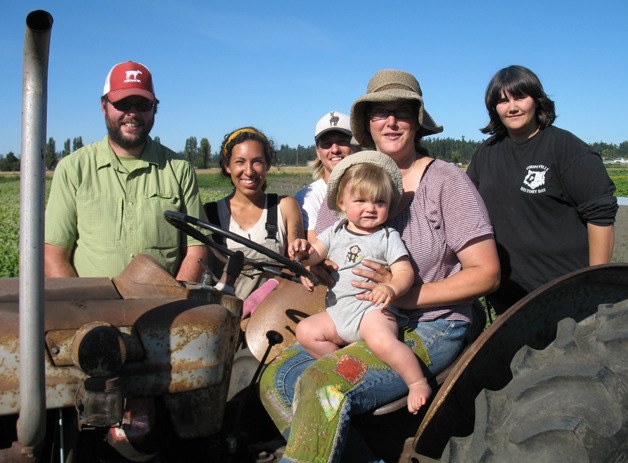“Farming feeds my soul,” says Linda Bartlett, co-owner with Valerie Reuther of Rosehip Farm near Coupeville.
Bartlett and 17 other Island farmers share some of that soul food along with techniques for growing real food at the free, 7th annual Whidbey Island Farm Tour, 10 a.m. to 4 p.m. Sept. 15-16.
The 2012 Farm Tour brochure is your guide to a weekend of agricultural fun and learning. Pick one up at local libraries, Chambers of Commerce, visitor centers, farm and garden stores, or download it from the official Farm Tour website, www.whidbeyfarmtour.com. The brochure contains a map of the Island with directions to each farm and details of each farm’s products.
“This year we’re really encouraging farmers to offer multiple activities on their farms, from scavenger hunts for kids to educational opportunities for learning the ‘how-to’ of good farming practices,” said Sarah Cassat of the Whidbey Island Conservation District and spokesperson for the 2012 Farm Tour.
If farm critters are your thing, check out the grass-fed beef cattle at 3 Sisters Farm in Oak Harbor, see a raptor up close at Pacific Rim Institute near Coupeville, watch a demonstration of saddle-seat riding at Wildwood Horse farm in Oak Harbor, or nuzzle an alpaca at one of the five alpaca ranches on the tour.
Cassat said local farmers have a goal of “showing what happens when produce, meat or fibers come from the farm, and how farmers can produce value-added products for steadier, year-round income.”
Several farms offer hayrides or self-guided tours of their operations and most will offer demonstrations or tutorials for folks wanting to learn new farming skills.
“Greenbank Farm will have multiple learning stations, including a self-guided tour of their Community Supported Agriculture farm and new rain garden and a family scavenger hunt,” Cassat said.
Rosehip Farm will showcase its sustainable farming practices that utilize hand tools over tractor use.
“The educational opportunity of the Farm Tour is important to us. We want to show what a small-scale grower can do and give concrete ideas to home gardeners,” Bartlett said.
Like many local farmers, Bartlett has a high standard for growing nutrient-rich food without chemicals.
“We strive to exclude pests by using crop covers, aim for good crop rotation, and use soil building techniques instead of using even allowable chemical solutions,” Bartlett said.
Wilbur and Julieanna Purdue of Prairie Bottom Farm in Coupeville feed 37 local families through their Community Supported Agriculture (CSA) farm, and hope to educate more people about their weekly produce-providing service. Their lucky CSA customers not only get several pounds of seasonal vegetables every week, but they can also pick flowers and herbs at the farm, and have a chance to buy their Thanksgiving turkeys from the farm’s free-range flock.
“We want to educate people about how small family farms can grow a variety of crops sustainably, and to show how to build up a farm in small increments without going into debt, such as our barn project-in-progress,” said Wilbur Purdue, pointing proudly to his new barn, where bean-thrashing will be demonstrated on the Farm Tour.
In the near future, the Purdues hope to finish a produce-washing room and a cooler room for veggie storage to the barn.
Both Prairie Bottom and Rosehip Farms are CSAs, have booths at the Coupeville Farmer’s Market and provide produce to local restaurants through fellow farmer Georgie Smith’s distribution service.
“Our farm community is collaborative,” Bartlett said. “Not only is the community supportive of farms through buying at the markets and farm stands and eating at restaurants that serve locally-grown food, but the farmers collaborate with and buy from one another.”
Many farmers on the tour work with one another year-round, said Bartlett. For example, Rosehip Farm’s store sells bio-dynamically-grown grains such as kamut, barley and spring wheat from local growers. Both Rosehip and Prairie Bottom farms will sell potatoes and Rockwell beans from Willowood Farm during the Farm Tour.
“We want people to know what’s available right here in their own backyard,” said Purdue, surveying his productive acreage.
“We farmers are happy to be a part of feeding local families and to see children coming to know a farming way of life,” Bartlett said.



